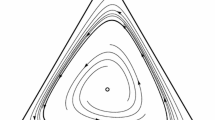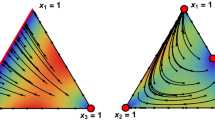Abstract
We extend Relative Monotonic Dynamics to Responsive Dynamics (RDs) to permit the response of the population to be history dependent, discontinuous and delayed. We introduce Strong Responsive Dynamics (SRDs) to model populations that are a little more responsive than in RDs, and define a relationship called quasi-strict dominance which characterizes the strategies that eventually die out under SRDs. These non-surviving strategies include the strategies that are weakly dominated by a pure strategy. If the game is quasi-strict-dominance solvable, then a SRD will converge to the quasi-strict-dominance solution, which is a weak proper NE. If the game is “quasi-strict-dominance ordered”, then a SRD will converge to a proper NE.
Similar content being viewed by others
References
Banerjee A, Weibull JW (1992a) Evolutionary selection and rational behavior. In: Kirman A, Salmon M (eds) Rationality and Learning in Economics, Blackwell
Banerjee A, Weibull JW (1992b) Evolution and rationality: Some recent game-theoretic results. Tenth World Congress of the International Economic Association, Moscow
Brandenberger A (1992) Knowledge and equilibrium in games. Journal of Economic Prospectives 6: 83–102
Cabrales A, Sobel J (1992) On the limit points of discrete selection dynamics. Journal of Economic Theory 57: 407–419
Canning D (1992) Average behavior in learning models. Journal of Economic Theory 57: 442–472
Van Damme E (1991) Stability and perfection of nash equilibria (2nd ed) Springer-Verlag, Berlin
Friedman D (1991) Evolutionary games in economics. Econometrica 59: 637–666
Gilboa I, Kalai E, Zemel E (1990) On the order of eliminating dominated strategies. Operations Research Letters 9: 85–89
Hansen RG, Samuelson WF (1988) Evolution in economic games. Journal of Economic Behavior and Organization 10: 315–338
Hofbauer J, Sigmund K (1988) The theory of evolution and dynamic system. Cambridge University Press, Cambridge
Maynard Smith J (1982) Evolution and the theory of games. Cambridge University Press, Cambridge
Moulin H (1986) Game theory for the social sciences. 2nd edition, New York University Press
Nachbar J (1990) Evolutionary selection dynamics in games: Convergence and limit properties. International Journal of Game Theory 19: 59–89
Samuelson L (1988) Evolutionary foundations of solution concepts for finite, two-player normal-form games. In: Vardi MY (ed) Theoretical Aspects of Reasoning About Knowledge, Morgan Kaufmann
Samuelson L (1992) Dominated strategies and common knowledge. Games and Economic Behavior 4: 284–313
Samuelson L, Zhang J (1992) Evolutionary stability in asymmetric games. Journal of Economic Theory 57: 363–391
Selten R (1991a) Anticipatory learning in two-person games. In: Selten R (ed) Game Equilibrium Models Vol I, Evolution and Game Dynamics, Springer-Verlag
Selten R (1991b) Evolution, learning, and economic behavior. Games and Economic Behavior 3: 3–24
Schuster P, Sigmund K (1983) Replicator dynamics. Journal of Theoretical Biology 100: 533–538
Stahl II DO (1991) Lexicographic rationality, common knowledge, and iterated admissibility. Working Paper, University of Texas at Austin
Stahl II DO (1993) Evolution of smart players. Games and Economic Behavior 5: 604–617
Tan T, Werlang SRC (1988) The Bayesian foundations of solution concepts of games. Journal of Economic Theory 45: 370–391
Author information
Authors and Affiliations
Rights and permissions
About this article
Cite this article
Lu, X., Stahl, D.O. Responsive and strong responsive evolutionary dynamics. Int J Game Theory 23, 101–117 (1994). https://doi.org/10.1007/BF01240178
Received:
Revised:
Issue Date:
DOI: https://doi.org/10.1007/BF01240178




